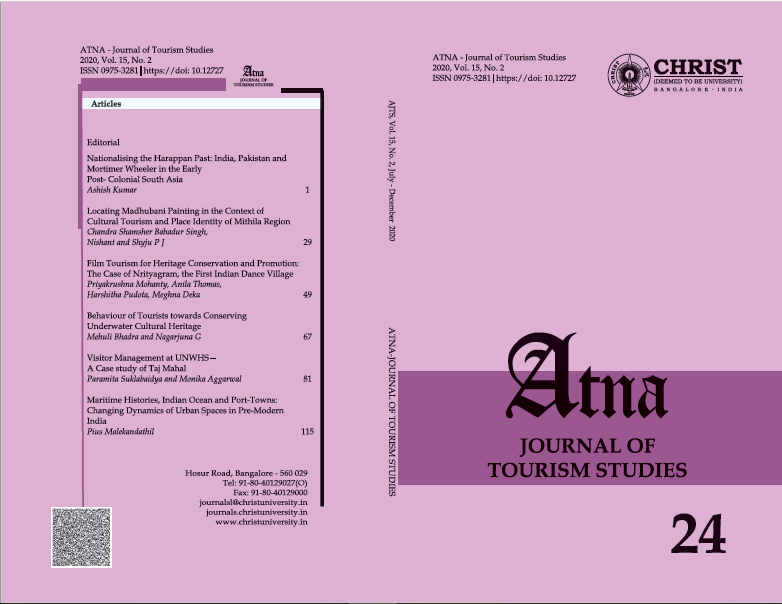Behavior of Tourists towards Conserving Underwater Cultural Heritage
DOI:
https://doi.org/10.12727/ajts.24.4Keywords:
Conservation, archeological, underwater cultural heritage, DestinationAbstract
Culture and heritage are one of the pull factors that attracts the tourists towards the destination. Tourists consume culture and heritage products in a different form such as experiencing the cuisines, participating in religious festivals, wearing cultural dresses, purchasing souvenirs which reflect culture and heritage of the destination, by visiting to heritage sites, museums and so on. Visiting land-based culture and heritage sites is quite common among tourists. Under the culture and heritage tag, underwater cultural water is getting more attention of the tourists since it give different, memorable and adventure experience. Underwater cultural heritage is nothing but traces of human existence having cultural, historical and archaeological character which have been partially or totally under water. It is essential to conserve and preserve the underwater cultural heritage since it holds the importance of past culture and tradition of the humans. The main objective of the study is to find out tourists’ awareness and importance of preserving underwater cultural heritage. The area of the study covers Gujarat and Tamil Nadu since each destination holds significant underwater cultural heritage value in India. The recommendations of the study will be useful to promote India has one of the prominent underwater cultural heritage destination
References
Argyropoulos, V and Strategia, A. (2019). Sustainable management of underwater cultural heritage: The route from discovery to engagement—Open issues in the Mediterranean. Heritage, 2. 1588-1613
Chui Teo, C.B., Mohd Khan, N.R. and Abd Rahim, F.H. (2014). Understanding cultural heritage visitors behavior: The case of Melaka as World Heritage City. Social and Behavioral Sciences, 130. 1-10
EL-Kady, M. (2017). Potentials of underwater cultural heritage in tourism from the perspective of tour guiding in Alexandria, Egypt. Journal of Tourism Research, 17(1). 222-237
Falt, E. (2020, September 24). World Maritime Day: India holds incredible underwater riches waiting to be discovered and recognised. The Indian Express. Retrieved from https:// indianexpress.com/article/ lifestyle/ art-and-culture/world-maritime-day-2020-india-holds-incredible-underwater-riches-waiting-to-be-discovered-recognised-6607411/
Gaur,A.S., Sundaresh, and Tripati, S (2004). An ancient harbour at Dwarka: Study based on the recent underwater explorations. Current Science, 86 (9). 1256-1260
Jing, Y. (2017). Protection of underwater cultural heritage in China: new developments. International Journal of Cultural Policy, 25(6). 756-764
McKinnon, J.F. (2015). Memorialization, Graffiti and Artifact Movement: A Case Study of Cultural Impacts on WWII Underwater Cultural Heritage in the Commonwealth of the Northern Mariana Islands. Journal of Maritime Archaeology,10. 11-27
Papageorgiou, M. (2019). Stakes and challenges for underwater cultural heritage in the era of blue growth and the role of spatial planning: Implications and prospects in Greece. Heritage, 2. 1060-1069
Partiseapate. (2013). Workshop: Maritime spatial planning as tool for underwater cultural heritage management. http:// www.partiseapate.eu/dialogue/workshop-cultural-heritage-tourism/
Scott –Ireton, D.A. and McKinnon, F.J. (2016). As the sand settles: Education and archaeological tourism on underwater cultural heritage. Public Archaeology, 14 (3). 157-171
Sundaresh, Gaur,A.S., Tripati, S and Vora, K,H. (2004). Underwater investigations off Mahabalipuram, Tamil Nadu, India. Current Science, 86 (9). 1231-1237
UNESCO. (2001). The benefits of the protection of underwater cultural heritage for sustainable growth, tourism and urban development. https://www.scubatravel.co.uk/unesco-underwater-tourism.pdf
UNESCO. (2001). The UNESCO convention on the protection of the underwater cultural heritage.http:// www.unesco.org/ new/ fileadmin/MULTIMEDIA/HQ/CLT/UNDERWATER/pdf/Infokit_en_Final.pdf
UNESCO. (n.d.). Underwater cultural heritage inscribed on UNESCO’s world heritage list. http:// www.unesco.org/ new/en/culture/ themes/underwater-cultural-heritage/museums-and-tourism/ underwater-cultural-heritage-inscribed-on-unescos-world-heritage-list/#:~:text=Relief%20of% 20the%20%22 Descend%20 of, presence %20of%20underwater%20archaeological%20remains.

Downloads
Published
How to Cite
Issue
Section
License
Copyright (c) 2021 Atna Journal of Tourism Studies

This work is licensed under a Creative Commons Attribution-NonCommercial 4.0 International License.

